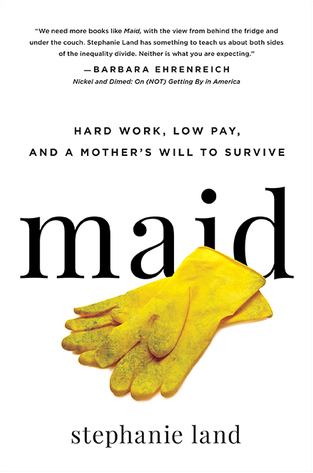Maid Book Summary
“Maid: Hard Work, Low Pay, and a Mother’s Will to Survive” by Stephanie Land is a powerful memoir about a young mother’s struggle to provide for her daughter while working as a house cleaner. Stephanie’s journey is filled with challenges, resilience, and determination as she fights to create a better life for herself and her child.
The book begins with Stephanie’s dream of attending college and becoming a writer. However, her plans are derailed when she becomes pregnant and decides to keep the baby. The relationship with her daughter’s father is strained. Eventually, it becomes abusive, leading Stephanie to leave him and find a way to support herself and her young daughter, Mia.
With no support from her family and limited options, Stephanie turns to government assistance programs to help make ends meet. She struggles with the stigma and shame associated with needing help. Still, she is determined to do whatever it takes to provide for Mia. Stephanie works as a maid, cleaning houses for wealthy clients in the Pacific Northwest.
Through her work, Stephanie witnesses the stark contrast between her life and the lives of the people whose homes she cleans. She describes the homes in vivid detail, from the opulent mansions with pristine surfaces to the tiny, cluttered houses of those struggling like her. Stephanie’s descriptions highlight the inequality and lack of understanding between different social classes.
One of the key themes of the book is the invisibility of the working poor. Stephanie often feels unseen and unappreciated in her job, as clients rarely acknowledge her presence or the hard work she puts into cleaning their homes. Despite her job’s physical and emotional toll, she finds moments of connection and insight through the personal items she encounters in the homes she cleans.
Stephanie’s story also illuminates the flawed and often dehumanizing welfare system. She details the complicated and bureaucratic process of applying for assistance, the judgmental attitudes of caseworkers, and the constant threat of losing benefits due to small changes in income or circumstances. Despite these challenges, Stephanie remains determined to improve her situation and provide a stable home for Mia.
Stephanie’s love for her daughter is a driving force throughout the book. She describes the joys and challenges of motherhood, from the sleepless nights and tantrums to the deep bond she shares with Mia. Stephanie’s determination to create a better life for Mia keeps her going, even when the obstacles seem insurmountable.
“Maid” also highlights the importance of education and self-improvement. Despite her demanding job and financial struggles, Stephanie takes online college courses and writes whenever possible. She dreams of becoming a writer and breaking free from the cycle of poverty. Her journey is a testament to the power of resilience and the pursuit of one’s dreams, no matter the circumstances.
The book is filled with poignant moments and reflections on the nature of work, poverty, and dignity. Stephanie’s honesty and vulnerability make her story relatable and impactful. She writes about the small victories and moments of joy that keep her going and the deep frustration and despair that often accompany her struggle.
In “Maid,” Stephanie Land gives a voice to the millions of people working low-paying jobs and relying on government assistance to survive. Her story is a powerful reminder of the human cost of economic inequality and the strength it takes to overcome adversity. Through her words, Stephanie inspires readers to see the dignity in all work and to recognize the resilience of those who fight to create a better life for themselves and their families.
Stephanie Land’s “Maid” is an important and moving memoir that illuminates the realities of the working poor. It is a story of hard work, perseverance, and the unbreakable bond between a mother and her child.
